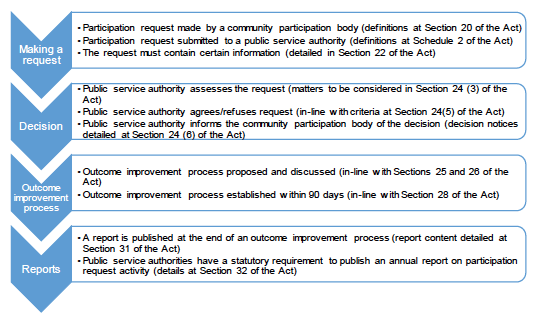Community Empowerment (Scotland) Act 2015 - participation requests: evaluation
Independent evaluation assessing the implementation of part 3 of the Community Empowerment (Scotland) Act 2015 – participation requests.
2. Background to participation requests
The Community Empowerment (Scotland) Act 2015 is central to empowering community bodies: strengthening their voices in local decision-making, ownership of land and buildings and supporting public sector reform by improving the process of community planning and its outcomes.
The Act provides a mechanism for community bodies to seek dialogue with public service providers on their own terms, when they feel they can help to improve outcomes. It gives them a right to be heard. Participation requests are focused on extending and improving community participation in improving outcomes for their communities. Participation request legislation came into force on 01 April 2017. The text of Part 3 of the Act is available online[5].
'Community participation body' (CPB) is the term given to the group of people who can submit participation requests. To qualify as a community participation body, a group must meet certain requirements. For instance, the group must be a geographic community or a group with shared interests or backgrounds. The majority of group members must come from the defined community, and the group needs to be open to other community members. Any profits generated through their activities must be used for community benefit and a statement of the group's aims and purposes must also be provided.
Participation requests have been introduced as complementary to – rather than a replacement for – existing participation and engagement processes. Other types of participation and engagement processes may be taking place alongside or instead of participation requests. These include: community-led action plan steering groups; action plans to ensure resilience in the face of emergencies; community participation in the development of healthcare strategies or redesign of services; and participatory budgeting.
Participation requests follow a structured process involving key steps (Figure 2). The process begins when a community participation body submits a participation request to a public service authority, requesting to participate in a process with a view to improving an outcome. Public service authorities then assess the request, in line with defined criteria detailed in the Act, and subsequently agree or refuse the request. Unless there are 'reasonable grounds' for refusal, public service authorities must agree to the request and set up an 'outcome improvement process'. If a request is refused, public service authorities must provide a reason justifying the decision. Refused participation requests do not advance to an outcome improvement process. At present, there are no grounds for appeals.
Where a participation request is agreed, public service authorities and community participation bodies must discuss how the outcome improvement process will work and how long it should take. The Scottish Government Guidance on participation requests (2017, p.43) defines an outcome improvement process as 'a process that will help improve the outcome set out by the community body'. While the Guidance provides outcome improvement process examples, individual outcome improvement processes may differ in their structure and in how long they should take, depending on the agreements made between community participation bodies and public service authorities. At the end of the process, public service authorities must publish a report summarising the process, detailing whether the outcomes were improved and how the community body contributed to that improvement.

Contact
Email: socialresearch@gov.scot
There is a problem
Thanks for your feedback